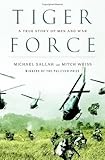Tiger Force, Michael Sallah and Mitch Weiss,
[rating:5/5]
This is a harrowing book. Especially reading it now, looking back on Vietnam with an eye on Iraq. Tiger Force was an elite group of US special forces working in free-fire zones in Central Vietnam. Some of these units were investigated (though never charged) with war crimes against Vietnamese civilians. All the stories you’ve heard of GI’s collecting necklaces of ears, elderly farmers beaten down with rifle butts, and even baby-killing are all here in graphic detail. And while I couldn’t put the book down, it left me feeling ill. The descriptions make you feel like you’re there, sweating with the soldiers in the Song Ve valley:
It wasn’t long before the team leader began complaining about the Song Ve. The platoon should be hunting VC, and instead they were stuck looking for villagers…The blisters on their feet were starting to break into open sores, and the men were constantly complaining of the overwhelming smell of manure blowing from the rice patties, where the villagers used animal and human waste to fertilize the fields. Two of the newcomers had carelessly pulled leeches from their legs earlier in the day, leaving wounds so deep the medics were worried about infections setting in.
Private Gary Kornatowski was already hobbling from the cuts in his shins left by the nasty green creatures. When he took off his boots earlier in the day, he had noticed his legs were covered and had quickly begun pulling off the leaches with his hands. The whole country was a collection of vampires, large and small.
The book covers the unit’s apparent devolution into barbarity as they lose comrades and realize that their task is impossible:
There were no real rules and regulations anymore. Half the unit had grown long, scraggly beards and had cut the sleeves off their uniforms. Kerrigan, Ybarra, and several others were openly wearing necklaces of ears, and others were carrying severed ears in pouches. Whenever the smell of rotting flesh was too strong, Ybarra would toss away his current necklace and make a new one from ears he carried in a ration bag filled with vinegar.
Most of the men had lost a great deal of weight, their faces gaunt, ribs protruding when they peeled off their shirts. At least a dozen were hooked on amphetamines and constantly pestered the medics for daily allowances.
The last third of the book leaves the jungle and covers an Army CID investigation in the atrocities. Though it seems obvious that their commanders had to know what was happening, and at least two soldiers admitted to murdering civilians, no charges were ever filed:
Charles Fulton was even more revealing, because he not only admitted to tossing grenades into a bunker but later heard the cries of the people underground. No one, he said, bothered to help the wounded Vietnamese. He freely admitted there were no weapons or signs of Vietcong.
Aspey wondered, Could this have been a routine practice? It violated the Army’s policies and procedures and the Geneva conventions. Worse, because there were so many bunkers, no one would ever know how many in the province were turned into mass underground graves.
He wondered with a growing sense of dread how far up the chain of command this case went.
Tiger Force, Michael Sallah and Mitch Weiss,
[rating:5/5]

